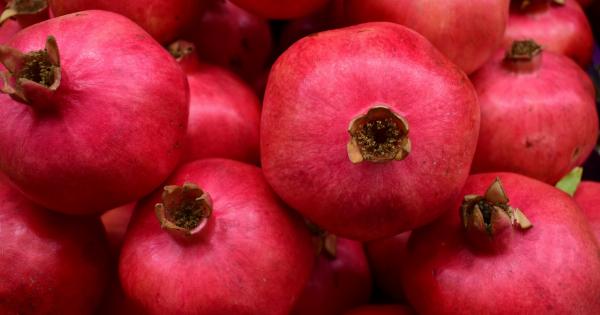Pomegranates have been cherished for centuries for their unique taste and numerous health benefits. This vibrant fruit is not only delicious but is also packed with powerful antioxidants and essential nutrients.
From its role in ancient myths to its modern-day popularity, pomegranates continue to captivate people of all ages. Let’s explore the fascinating story behind this versatile fruit and discover why it truly is the fruit that keeps on giving.
Ancient Origins and Symbolism
Pomegranates have deep roots in ancient history and mythology. Originating from the region known as the Fertile Crescent, which encompasses modern-day Iran and Iraq, pomegranates have been grown and consumed in this area for over 4,000 years.
In Greek mythology, the pomegranate was associated with fertility, abundance, and the underworld.
Its iconic appearance in the myth of Persephone, who is said to have consumed a few pomegranate seeds during her stay in the underworld, gives the fruit a symbolic connection to death and rebirth.
In many cultures, pomegranates are seen as a symbol of prosperity, unity, and good fortune. In ancient Persia, it was believed that consuming pomegranates would bring about immortality.
This rich historical background has contributed to the enigmatic allure of the pomegranate, making it a fruit with deep cultural significance.
The Nutritional Powerhouse
Beyond its mythical associations, pomegranates are widely recognized for their remarkable nutritional profile. Packed with vitamins, minerals, and antioxidants, this fruit provides an array of health benefits.
1. Rich in Antioxidants
Pomegranates are bursting with antioxidants, particularly punicalagins and anthocyanins. These compounds help protect our cells from damage caused by free radicals, which are unstable molecules that can contribute to chronic diseases.
2. High in Vitamin C
One pomegranate typically contains around 45% of the recommended daily intake of vitamin C. This essential vitamin supports a healthy immune system, promotes collagen production, and aids in iron absorption.
3. Source of Important Minerals
Pomegranates contain minerals such as potassium, which is essential for proper heart and muscle function, and copper, which supports the production of red blood cells and connective tissues.
4. Fiber-Rich Fruit
With around 7 grams of fiber per pomegranate, this fruit is an excellent addition to a balanced diet. Adequate fiber intake promotes digestion, helps maintain a healthy weight, and supports heart health.
Health Benefits
Beyond their nutritional value, pomegranates offer an array of health benefits that have been recognized and studied scientifically. Here are some of these remarkable benefits:.
1. Heart Health
The antioxidants present in pomegranates can help reduce oxidative stress and inflammation, both of which are factors that contribute to heart disease.
Consuming pomegranates regularly has been associated with improved cardiovascular health, including reduced blood pressure and cholesterol levels.
2. Anti-Cancer Properties
Studies have shown that pomegranate extracts can inhibit the growth of certain cancer cells, including breast and prostate cancer. The potent antioxidants in pomegranates help protect cells from DNA damage and prevent the spread of cancerous cells.
3. Boosted Immune System
Thanks to its high vitamin C content, pomegranates can enhance our immune system’s response to infections and diseases.
Vitamin C stimulates the production of white blood cells, which are crucial for fighting off pathogens and keeping our bodies healthy and resilient.
4. Anti-Inflammatory Effects
Pomegranates have natural anti-inflammatory properties. Regular consumption of pomegranate juice or extracts has been shown to reduce inflammation in the body, promoting overall health and potentially alleviating symptoms of chronic diseases.
Inspiring Culinary Applications
Pomegranates are not only nutritionally outstanding but also versatile and flavorful. Their vibrant red arils can jazz up a variety of dishes and add a burst of sweetness and tanginess.
Here are a few exciting culinary applications for this delightful fruit:.
1. Fresh Pomegranate Juice
Squeeze the juice out of the arils and enjoy a refreshing drink packed with antioxidants. You can also mix it with other fruits or use it as a base for smoothies.
2. Pomegranate Molasses
Simmer pomegranate juice until it thickens into a rich, tangy syrup that adds depth of flavor to both sweet and savory dishes. Pomegranate molasses is a common ingredient in Middle Eastern cuisine.
3. Salad Enhancer
Sprinkle pomegranate arils over salads to add a pop of color, texture, and sweetness. They pair exceptionally well with leafy greens, feta cheese, and nuts.
4. Dessert Toppings
Pomegranate arils make beautiful and delicious toppings for desserts like cakes, ice creams, and puddings. They add a refreshing element and create an enticing visual appeal.
Pomegranates: A Fruit Worth Celebrating
From their ancient symbolism to their modern nutritional benefits and culinary uses, pomegranates truly are a fruit that keeps on giving.
Whether enjoyed on their own, in juices, or as a versatile ingredient, pomegranates are a delightful addition to a healthy lifestyle. Embrace the magic of this ancient fruit and let its vibrant qualities enrich your well-being.





























